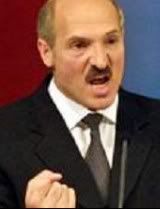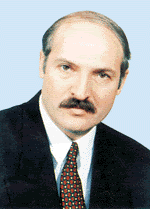A democracy of deception
Today I read a very interesting article in a newsletter produced by the Centre for Eastern Studies in Poland, describing how different candidates for the presidential election in Belarus are running their campaigns.



The incumbent, Aleksandr Lukashenko (pictured), is one of four men standing and re-election is looking likely. He’s hoping to deliver a crushing victory which will highlight the incompetence of his opposition. Aleksandr Milinkievich is the closest rival. Campaigning isn’t officially to begin until February 21, but there are many indicators even now that this is not a fair contest.
For anyone who doesn’t know about the political situation in Belarus, let me give a very brief summary: Lukashenko is a tyrannical leader, employing unacceptable methods to maintain power and frequently violating the human rights of many citizens. A good example is how he went about collecting the required 100,000 signatures needed to become a presidential candidate. They were gathered in workplaces, universities and student dormitories, among others, with people often forced to sign by superiors threatening termination of employment or residential expulsion. In one case, a student refusing to sign Lukashenko’s list was beaten up by police.
That’s not all. The President is known for monopolisation of the media and there is evidence to back this up. The Belarusian Association of Journalists revealed that between January 16-27, names of candidates other than Lukashenko appeared only in independent newspapers. He occupied 90% of the election coverage on ONT, the most popular TV channel (the rest was given to the Central Electoral Commission and observers).
The 51-year-old also employs more subtle methods to his propaganda. A series of weekly concerts in major cities, featuring famous musical names from Belarus and Russia, were advertised under the slogan “For Belarus!” – a catchphrase taken from Lukashenko’s campaign before a referendum in 2004 which allowed him to stand for his third term.
In contrast to this, Aleksandr Milinkievich’s campaign is facing numerous constraints from the electoral authorities. He is not allowed to organise meetings with voters or distribute literature/posters before the official campaigning period begins later this month. Additionally, the former NGO activist has no access to state-owned media. The only activities he can get away with are meeting people in markets, or workers outside large enterprises; he’s trying to visit all regions of the country.
However, despite these difficulties, Milinkievich is enjoying an increase in public recognition. After three months of campaigning, Baltic Gallup Surveys found 80% of respondents had heard of Milinkevich – compared with 30% in October 2004. 18% said they would vote for him, compared to under 10% last time. His support group also managed to gather twice the number of signatures required to confirm his registration as a candidate.
This “battle” of two Aleksandrs (actually there are three overall, Aleksandr Kazulin is another candidate) looks to be a foregone conclusion. Lukashenko is clearly ahead in opinion polls; the people of Belarus are overwhelmed by fear of what might happen if they don’t pick him. And if that wasn’t enough to guarantee a landslide victory, there’s also the possibility Milinkievich could be completely excluded if his ratings continue to rise. Belarusian electoral law allows candidates to be removed from the voting list, even if the ballot is ongoing, and also provides many justifications for such a measure.
So the people of this blighted country look to be in for another term of corrupt, deceitful and oppressive rule from President Lukashenko. It always seems to be crooked African leaders hitting the headlines in this country; there is little or no realisation that terrible things like this are going relatively unnoticed a lot closer to home.



The incumbent, Aleksandr Lukashenko (pictured), is one of four men standing and re-election is looking likely. He’s hoping to deliver a crushing victory which will highlight the incompetence of his opposition. Aleksandr Milinkievich is the closest rival. Campaigning isn’t officially to begin until February 21, but there are many indicators even now that this is not a fair contest.
For anyone who doesn’t know about the political situation in Belarus, let me give a very brief summary: Lukashenko is a tyrannical leader, employing unacceptable methods to maintain power and frequently violating the human rights of many citizens. A good example is how he went about collecting the required 100,000 signatures needed to become a presidential candidate. They were gathered in workplaces, universities and student dormitories, among others, with people often forced to sign by superiors threatening termination of employment or residential expulsion. In one case, a student refusing to sign Lukashenko’s list was beaten up by police.
That’s not all. The President is known for monopolisation of the media and there is evidence to back this up. The Belarusian Association of Journalists revealed that between January 16-27, names of candidates other than Lukashenko appeared only in independent newspapers. He occupied 90% of the election coverage on ONT, the most popular TV channel (the rest was given to the Central Electoral Commission and observers).
The 51-year-old also employs more subtle methods to his propaganda. A series of weekly concerts in major cities, featuring famous musical names from Belarus and Russia, were advertised under the slogan “For Belarus!” – a catchphrase taken from Lukashenko’s campaign before a referendum in 2004 which allowed him to stand for his third term.
In contrast to this, Aleksandr Milinkievich’s campaign is facing numerous constraints from the electoral authorities. He is not allowed to organise meetings with voters or distribute literature/posters before the official campaigning period begins later this month. Additionally, the former NGO activist has no access to state-owned media. The only activities he can get away with are meeting people in markets, or workers outside large enterprises; he’s trying to visit all regions of the country.
However, despite these difficulties, Milinkievich is enjoying an increase in public recognition. After three months of campaigning, Baltic Gallup Surveys found 80% of respondents had heard of Milinkevich – compared with 30% in October 2004. 18% said they would vote for him, compared to under 10% last time. His support group also managed to gather twice the number of signatures required to confirm his registration as a candidate.
This “battle” of two Aleksandrs (actually there are three overall, Aleksandr Kazulin is another candidate) looks to be a foregone conclusion. Lukashenko is clearly ahead in opinion polls; the people of Belarus are overwhelmed by fear of what might happen if they don’t pick him. And if that wasn’t enough to guarantee a landslide victory, there’s also the possibility Milinkievich could be completely excluded if his ratings continue to rise. Belarusian electoral law allows candidates to be removed from the voting list, even if the ballot is ongoing, and also provides many justifications for such a measure.
So the people of this blighted country look to be in for another term of corrupt, deceitful and oppressive rule from President Lukashenko. It always seems to be crooked African leaders hitting the headlines in this country; there is little or no realisation that terrible things like this are going relatively unnoticed a lot closer to home.





2 Comments:
Hi Fred: after you gave me your website yesterday, I looked up your blog: I liked this article on Belarus. The first picture at the top reminds me of Chaplin in "The Great Dictator": another case of life imitating art.
Impressed by your curiousity Fred about my country. in case you want to see some shared views on the situation, check this out: http://www.br23.net/en/
Cheers,
Post a Comment
<< Home